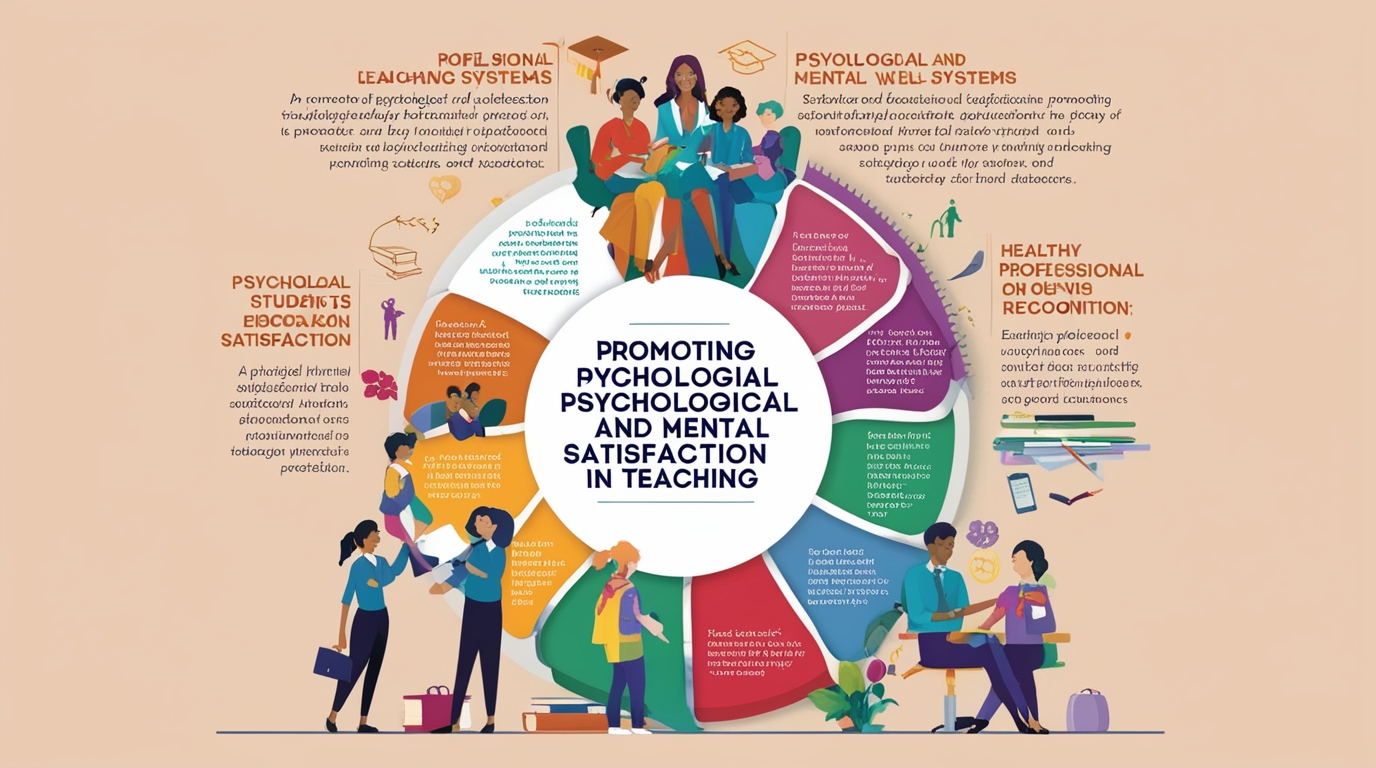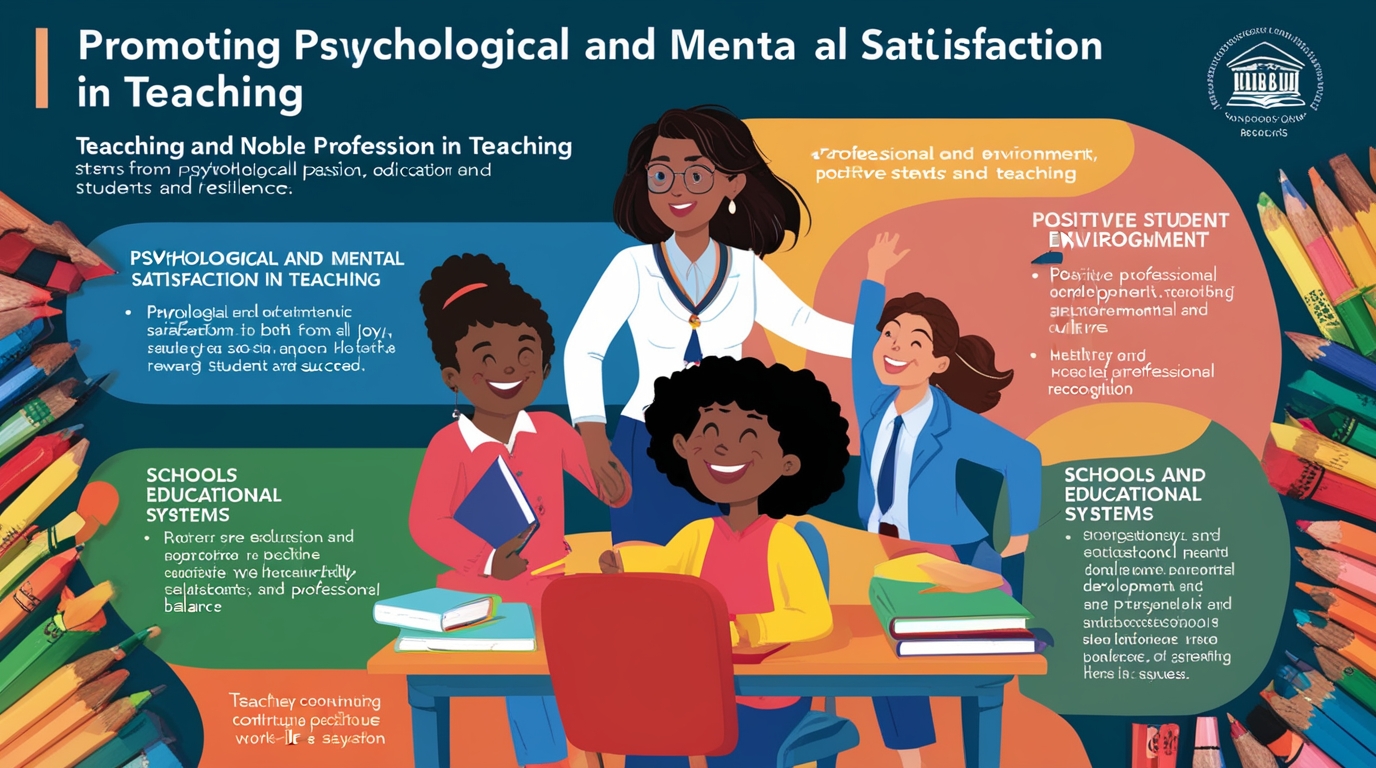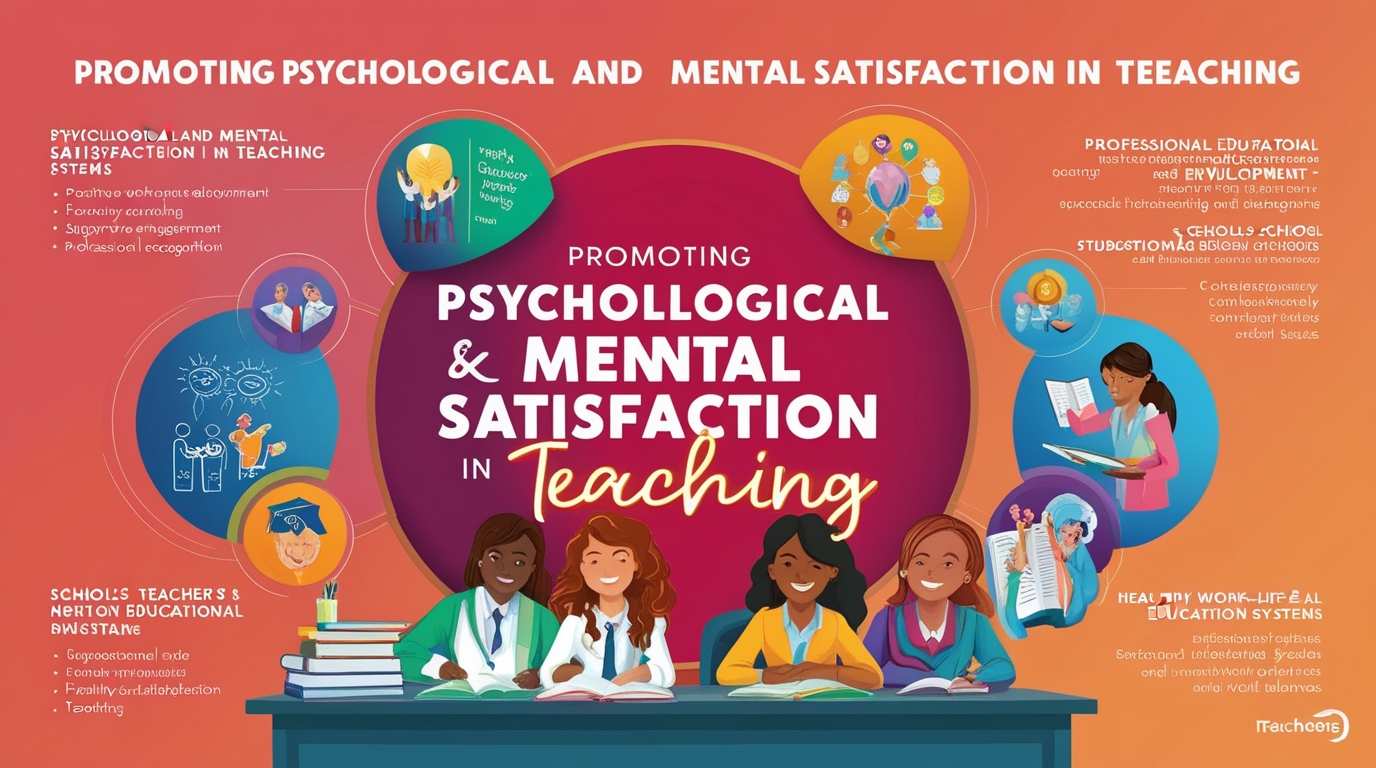Psychological and Mental Satisfaction in Teaching Teaching is more than a profession; it is a vocation that demands immense dedication, patience, and empathy. Psychological and mental satisfaction in teaching is a multifaceted concept influenced by various intrinsic and extrinsic factors. This article explores the dimensions of psychological and mental satisfaction in teaching, the factors that contribute to it, and the implications for both educators and the educational system.
Dimensions of Psychological and Mental Satisfaction
Intrinsic Satisfaction
Intrinsic satisfaction in teaching arises from the internal rewards that educators experience. These rewards include the joy of imparting knowledge, the sense of achievement when students succeed, and the personal growth that comes from continuous learning and reflection. Intrinsic satisfaction is closely tied to the passion for teaching and the fulfillment derived from making a positive impact on students’ lives.
Extrinsic Satisfaction
Extrinsic satisfaction involves external rewards and recognition. This includes salary, job security, work conditions, and professional development opportunities. While intrinsic factors are crucial, extrinsic factors play a significant role in ensuring that teachers feel valued and supported within their profession.

Factors Contributing to Psychological and Mental Satisfaction
Professional Autonomy
One of the key factors contributing to psychological satisfaction in teaching is professional autonomy. When teachers have the freedom to design their curriculum, choose teaching methods, and make decisions about their classroom environment, they are more likely to feel a sense of ownership and satisfaction. Autonomy fosters creativity and innovation, allowing teachers to tailor their approaches to meet the unique needs of their students.
Supportive Work Environment
A supportive work environment is essential for mental satisfaction. This includes positive relationships with colleagues, supportive leadership, and access to resources. Schools that foster a collaborative culture and provide professional development opportunities contribute significantly to teachers’ mental well-being. Mentorship programs and peer support networks can also help new teachers navigate the challenges of the profession.
Student Engagement and Achievement
The level of student engagement and achievement is a direct indicator of teaching effectiveness and a source of psychological satisfaction. When students are motivated, participate actively, and demonstrate academic progress, teachers experience a sense of accomplishment. Positive feedback from students and parents reinforces the value of their efforts and enhances their mental satisfaction.
Work-Life Balance
Maintaining a healthy work-life balance is crucial for mental satisfaction. Teaching can be demanding, with long hours spent on lesson planning, grading, and extracurricular activities. Schools that recognize the importance of work-life balance and implement policies to support it, such as reasonable workload expectations and flexible schedules, help prevent burnout and promote mental well-being.
Implications for Educators
Enhancing Intrinsic Motivation
For educators to experience psychological and mental satisfaction, it is essential to nurture their intrinsic motivation. Schools can create environments that encourage passion for teaching by recognizing and celebrating teachers’ achievements, providing opportunities for professional growth, and fostering a culture of continuous learning.
Building Resilience
Teaching can be emotionally demanding, and building resilience is crucial for maintaining mental satisfaction. Professional development programs that focus on stress management, mindfulness, and self-care can equip teachers with the tools they need to cope with challenges. Encouraging teachers to seek support when needed and providing access to counseling services can also promote mental well-being.
Encouraging Collaboration
Collaboration among teachers is a powerful factor in enhancing psychological satisfaction. Schools can facilitate collaboration by organizing team-teaching opportunities, professional learning communities, and regular staff meetings. Sharing best practices, discussing challenges, and celebrating successes together create a sense of community and shared purpose.

Implications for the Educational System
Addressing Systemic Issues
To ensure psychological and mental satisfaction in teaching, the educational system must address systemic issues such as inadequate funding, large class sizes, and lack of resources. Policymakers and educational leaders must advocate for better working conditions, competitive salaries, and sufficient support for schools. Addressing these issues can alleviate stress and improve overall job satisfaction for teachers.
Promoting Professional Development
Continuous professional development is vital for teachers’ psychological and mental satisfaction. Educational systems should invest in ongoing training programs that help teachers stay updated with the latest teaching methodologies, technological advancements, and subject knowledge. Professional development should be tailored to meet the diverse needs of teachers and provide opportunities for career advancement.
Creating a Positive School Culture
A positive school culture is essential for the mental satisfaction of teachers. Educational leaders must prioritize creating a culture of respect, trust, and collaboration. This includes fostering open communication, recognizing teachers’ contributions, and promoting a supportive and inclusive environment. A positive school culture enhances teachers’ sense of belonging and psychological well-being.
Conclusion
Psychological and mental satisfaction in teaching is a complex interplay of intrinsic and extrinsic factors. Professional autonomy, a supportive work environment, student engagement, and work-life balance are critical contributors to teachers’ satisfaction. Educators must enhance intrinsic motivation, build resilience, and encourage collaboration to thrive. The educational system must address systemic issues, promote professional development, and create a positive school culture. By prioritizing the psychological and mental satisfaction of teachers, we can ensure a motivated, dedicated, and effective teaching workforce that positively impacts students’ lives and society.

ouc5wx
a9a8zf
My spouse and i ended up being very ecstatic that Louis could finish up his homework from the precious recommendations he obtained out of the blog. It’s not at all simplistic to just happen to be giving out helpful hints which often most people might have been making money from. And we also understand we need you to appreciate for this. Those illustrations you’ve made, the simple site menu, the friendships you will make it easier to foster – it’s most great, and it is helping our son in addition to the family consider that the situation is cool, and that’s truly vital. Thank you for the whole lot!
Adorei este site. Para saber mais detalhes acesse nosso site e descubra mais. Todas as informações contidas são informações relevantes e exclusivos. Tudo que você precisa saber está está lá.
Do you have a spam problem on this blog; I also am a blogger, and I was curious about your situation; many of us have created some nice methods and we are looking to trade solutions with others, be sure to shoot me an email if interested.
Hi there! I just wanted to ask if you ever have any issues with hackers? My last blog (wordpress) was hacked and I ended up losing a few months of hard work due to no data backup. Do you have any solutions to protect against hackers?
I’d have to examine with you here. Which is not one thing I usually do! I take pleasure in reading a post that may make folks think. Additionally, thanks for permitting me to comment!
This blog is definitely rather handy since I’m at the moment creating an internet floral website – although I am only starting out therefore it’s really fairly small, nothing like this site. Can link to a few of the posts here as they are quite. Thanks much. Zoey Olsen
I was recommended this web site by my cousin. I am not sure whether this post is written by him as no one else know such detailed about my difficulty. You are incredible! Thanks!
I love your blog.. very nice colors & theme. Did you create this website yourself? Plz reply back as I’m looking to create my own blog and would like to know wheere u got this from. thanks
Everything is very open and very clear explanation of issues. was truly information. Your website is very useful. Thanks for sharing.
Great blog! I am loving it!! Will be back later to read some more. I am taking your feeds also.
Hi would you mind sharing which blog platform you’re working with? I’m planning to start my own blog soon but I’m having a difficult time making a decision between BlogEngine/Wordpress/B2evolution and Drupal. The reason I ask is because your layout seems different then most blogs and I’m looking for something completely unique. P.S Sorry for being off-topic but I had to ask!
I besides believe therefore, perfectly indited post! .
Thanx for the effort, keep up the good work Great work, I am going to start a small Blog Engine course work using your site I hope you enjoy blogging with the popular BlogEngine.net.Thethoughts you express are really awesome. Hope you will right some more posts.
You are my intake, I have few web logs and very sporadically run out from to post : (.
0kcoiq
0kcoiq
Some really superb articles on this internet site, regards for contribution. “There is one universal gesture that has one universal message–a smile” by Valerie Sokolosky.